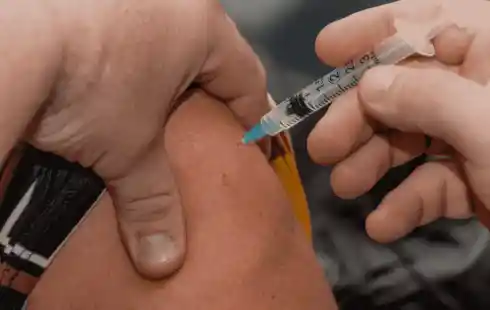
Pantone's Color of the Year an Endless Neutral Loop
Section: Fashion
 In a groundbreaking development, researchers are optimistic about the potential of a revolutionary vaccination not only in combating prevalent diseases like COVID-19 and influenza but also in the realm of cancer research. This innovative vaccine aims to shield individuals from cancer relapse following surgery, offering a ray of hope in the fight against this formidable disease.
In a groundbreaking development, researchers are optimistic about the potential of a revolutionary vaccination not only in combating prevalent diseases like COVID-19 and influenza but also in the realm of cancer research. This innovative vaccine aims to shield individuals from cancer relapse following surgery, offering a ray of hope in the fight against this formidable disease.
Traditionally, vaccinations are administered as preventive measures before the onset of illness. However, recent focus has shifted towards post-surgery vaccination to thwart cancer recurrence. According to Katja Silberbach, Director of Medical Affairs at pharmaceutical company MSD, in an interview with RTL, an mRNA vaccine currently under investigation is designed to be administered post-tumor removal, specifically targeting cancer relapse.
At the forefront of this research is the Berlin Charité, where trials are underway to assess the efficacy of the vaccination. An 81-year-old participant, diagnosed with melanoma last November and subsequently treated through surgery, is currently undergoing evaluation to gauge the vaccine's impact. Skin cancer poses a particularly high risk of recurrence, as highlighted in an RTL report. Unlike conventional vaccines such as those for COVID-19, this vaccination approach is highly personalized, with each vaccine tailored to the individual patient.
Professor Thomas Eigentler from the Charité Berlin emphasizes the necessity of this individualized therapy, acknowledging the unique nature of each tumor. Currently manufactured in the USA, these personalized vaccines stimulate the body's cells to produce specific cancer antigens, thereby activating the immune response. Katja Silberbach elucidates this process, expressing optimism based on promising research outcomes.
The German Cancer Research Center (dkfz) has also underscored the potential of mRNA vaccines in cancer therapy. Oncologist Niels Halama highlights the therapy's objective: to empower the immune system to recognize and combat tumors effectively. By overcoming the camouflage mechanism employed by cancer cells, the mRNA vaccine aims to prevent tumor recurrence, ensuring that malignant cells are identified as foreign entities by the immune system.
As research progresses, the prospect of mRNA vaccination as a pivotal tool in cancer treatment evokes a sense of hope among medical professionals and patients alike. With promising results emerging, this innovative approach holds immense promise in revolutionizing cancer care and potentially saving countless lives.
Image by LuAnn Hunt from Pixabay

Section: Fashion

Section: News

Section: Fashion

Section: Arts

Section: Politics

Section: Health Insurance

Section: News

Section: News

Section: News

Section: Arts
Both private Health Insurance in Germany and public insurance, is often complicated to navigate, not to mention expensive. As an expat, you are required to navigate this landscape within weeks of arriving, so check our FAQ on PKV. For our guide on resources and access to agents who can give you a competitive quote, try our PKV Cost comparison tool.
Germany is famous for its medical expertise and extensive number of hospitals and clinics. See this comprehensive directory of hospitals and clinics across the country, complete with links to their websites, addresses, contact info, and specializations/services.
Join us for an enchanting Christmas adventure at the Münchner Marionettentheater! Experience the marionette play 'Der verschwundene Wunschzettel' by Siegfried Böhmke, featuring our beloved Kasperl Larifari and his little friend Stupsi. As Christmas approaches, both Kasperl and Stupsi have prepared...



No comments yet. Be the first to comment!